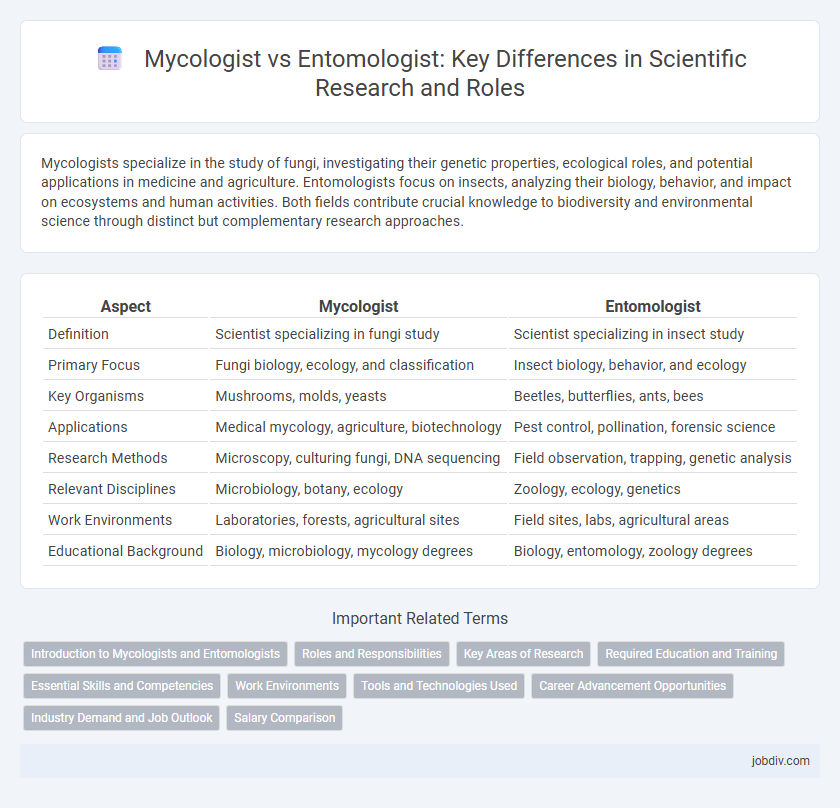Mycologists specialize in the study of fungi, investigating their genetic properties, ecological roles, and potential applications in medicine and agriculture. Entomologists focus on insects, analyzing their biology, behavior, and impact on ecosystems and human activities. Both fields contribute crucial knowledge to biodiversity and environmental science through distinct but complementary research approaches.
Table of Comparison
| Aspect | Mycologist | Entomologist |
|---|---|---|
| Definition | Scientist specializing in fungi study | Scientist specializing in insect study |
| Primary Focus | Fungi biology, ecology, and classification | Insect biology, behavior, and ecology |
| Key Organisms | Mushrooms, molds, yeasts | Beetles, butterflies, ants, bees |
| Applications | Medical mycology, agriculture, biotechnology | Pest control, pollination, forensic science |
| Research Methods | Microscopy, culturing fungi, DNA sequencing | Field observation, trapping, genetic analysis |
| Relevant Disciplines | Microbiology, botany, ecology | Zoology, ecology, genetics |
| Work Environments | Laboratories, forests, agricultural sites | Field sites, labs, agricultural areas |
| Educational Background | Biology, microbiology, mycology degrees | Biology, entomology, zoology degrees |
Introduction to Mycologists and Entomologists
Mycologists specialize in the study of fungi, including their genetics, taxonomy, and ecological roles, contributing crucial insights into fungal biodiversity and disease control. Entomologists focus on insects, analyzing their behavior, physiology, and interactions within ecosystems to support agriculture, pest management, and environmental monitoring. Both fields employ advanced research techniques such as molecular biology and bioinformatics to enhance understanding of their respective organisms and their impact on human environments.
Roles and Responsibilities
Mycologists specialize in studying fungi, including their genetic properties, biochemical processes, and ecological roles, often conducting laboratory experiments and field research to understand fungal behavior and applications in medicine and agriculture. Entomologists focus on insects, analyzing their taxonomy, life cycles, and interactions within ecosystems to manage pests, support pollination, and advance biodiversity conservation. Both roles require expertise in identifying species, collecting samples, and applying findings to environmental management and scientific innovation.
Key Areas of Research
Mycologists specialize in the study of fungi, exploring fungal genetics, ecology, and their roles in nutrient cycling and disease. Entomologists focus on insects, investigating their behavior, physiology, taxonomy, and impact on ecosystems and agriculture. Both scientists contribute to biodiversity research, but mycologists emphasize fungal biology, while entomologists prioritize insect-related phenomena.
Required Education and Training
Mycologists typically hold advanced degrees such as a master's or Ph.D. in mycology, microbiology, or biology, emphasizing fungal biology, taxonomy, and ecology during their studies. Entomologists often pursue bachelor's, master's, or doctoral degrees in entomology, zoology, or agricultural sciences, with specialized training in insect physiology, behavior, and pest management. Both fields require extensive laboratory experience and fieldwork to develop expertise in species identification and ecological impact assessment.
Essential Skills and Competencies
Mycologists require strong expertise in fungal taxonomy, microscopy, and biochemical analysis to study fungal species and their ecological roles accurately. Entomologists must possess advanced skills in insect identification, behavior analysis, and ecological surveying to understand insect interactions and impacts on ecosystems. Both professions demand proficiency in field research techniques, data collection, and statistical analysis for scientific experimentation and environmental assessments.
Work Environments
Mycologists primarily conduct research and fieldwork in environments rich in fungi, such as forests, soil habitats, and laboratories specializing in microbiology or plant pathology. Entomologists often work in diverse settings including agricultural fields, forests, laboratories, and museums, focusing on insect behavior, ecology, and pest management. Both professions require controlled laboratory conditions for specimen analysis and experiments, but their field sites vary significantly based on their organism of study.
Tools and Technologies Used
Mycologists utilize advanced microscopy, DNA sequencing, and culturing techniques to study fungal species and their genetic material, enabling precise identification and analysis of fungal biology. Entomologists employ tools such as insect traps, pheromone lures, stereomicroscopes, and genetic analysis technologies to observe insect behavior, taxonomy, and ecosystems. Both fields leverage bioinformatics and imaging software to enhance data collection and interpretation, supporting research in biodiversity and environmental impact.
Career Advancement Opportunities
Mycologists specializing in fungal biology can advance their careers through research positions, academic roles, and biotechnology industries focused on pharmaceuticals and agriculture. Entomologists have opportunities in pest control, environmental conservation, and forensic science, with career growth often linked to government agencies and private sector companies. Both fields demand continuous learning and can lead to leadership roles in scientific research and policy development.
Industry Demand and Job Outlook
Mycologists specializing in fungal research see growing industry demand in pharmaceuticals and agriculture due to the rising need for natural antibiotics and biofertilizers. Entomologists experience strong job outlooks in pest control, environmental conservation, and biotechnology sectors driven by integrated pest management and ecosystem sustainability initiatives. Both professions benefit from expanding research funding, but entomology currently offers broader employment opportunities across public health and food production industries.
Salary Comparison
Mycologists specializing in fungi typically earn an average salary ranging from $60,000 to $90,000 annually, reflecting their expertise in fungal biology and applications in agriculture and medicine. Entomologists, who study insects, often have a slightly broader salary range of $55,000 to $95,000, influenced by roles in research, pest control, and environmental management. Salary variations for both professions depend on factors such as education level, geographic location, and specific industry sectors, with government and academic positions frequently offering more competitive compensation.
Mycologist vs Entomologist Infographic

 jobdiv.com
jobdiv.com